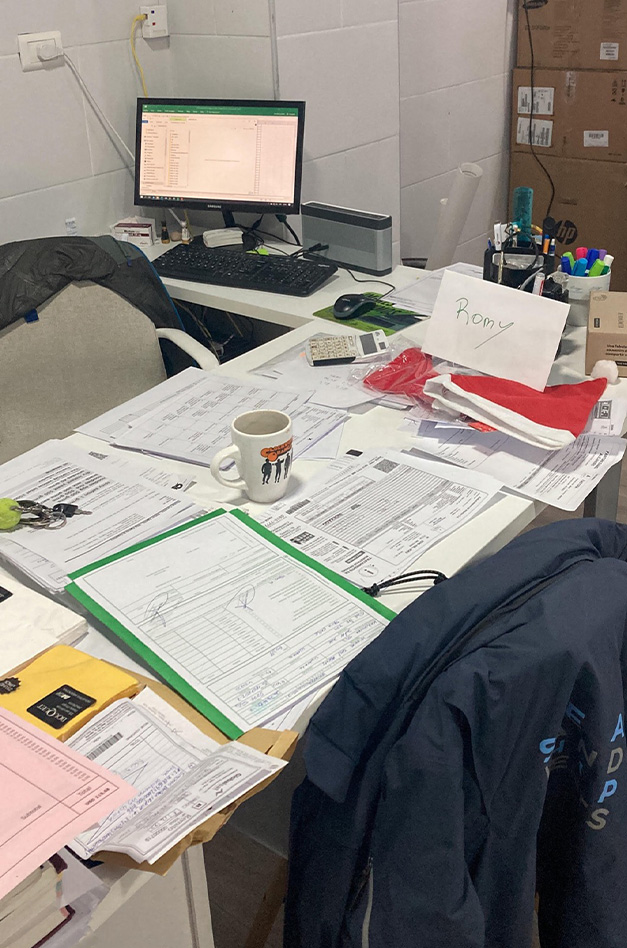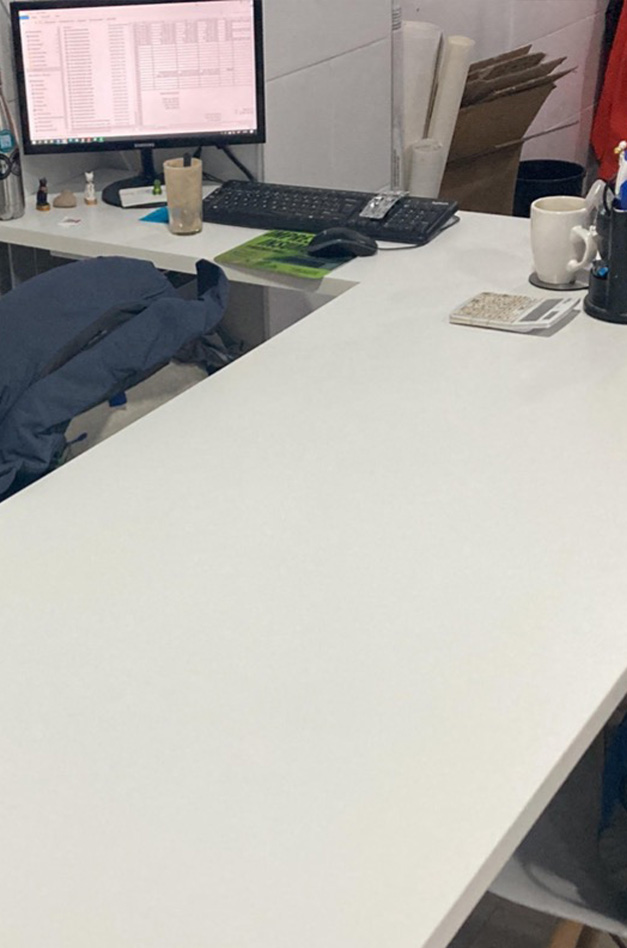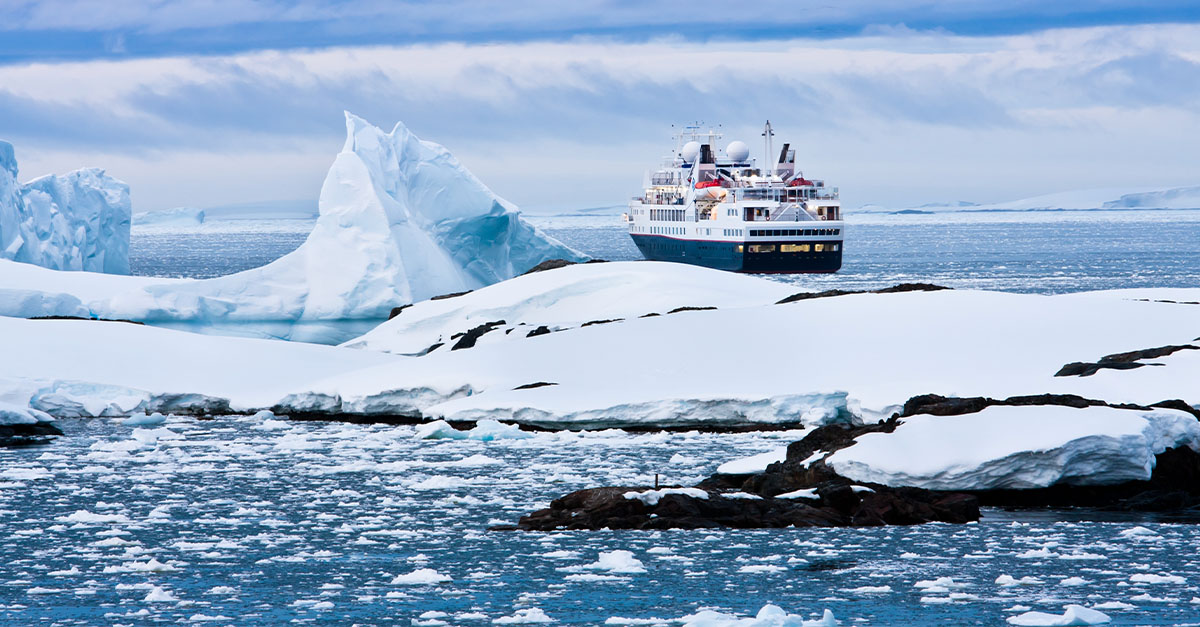The Antarctic cruise and expedition season runs from October to April every year. And once it begins, every member of our team works ceaselessly (often from 5:00 AM to 10:00 PM) to ensure a once-in-a-lifetime experience for every passenger. “From the moment they book their ticket on one side of the world,” says Managing Director Vero Palacios, “to the day they’re on deck of the ship, enjoying a barbeque while gazing at icebergs — we’re collaborating to provide an exceptional experience.”
This can involve managing details for up to 290 calls per season, checking daily to make sure everything is working well. Vessels are repositioned in the port of Ushuaia every 10 days, with some days involving eight ships at a time. At the height of the season, we’re managing ships both at the pier waiting to depart, and those that have already arrived at their destination — both of whom have different logistical demands.
“Once a ship leaves the pier,” explains General Manager German Manterola “they won’t come back to land until they return. So that means everything has to be on board before they go, and everything has to come off when they return: garbage, food, spare parts, passengers, crew, supplies, etc.”
“Each detail must be buttoned up, which includes permissions and authorizations from three to four different authorities, each with different requirements. Every person has to go through the immigration authorities, for example. Every single item that we embark or disembark has to go through customs. It’s why we supply clients with our personal cell phone numbers, so that we can respond immediately and directly. You spend a lot of time running behind the horse. Everything is for yesterday. For my mother it is really difficult to understand what I do for a living.”
So what do we do during the off season?
Feedback and Forecasting
“Almost as soon as the season ends,” says Palacios, “we’re out visiting our clients to hear how everything went, what we need to[VBP1] do differently next time, how costs may need to change, what necessities may be altered. Anything from sourcing and logistics, staffing, or even how to move a submarine — we gather general feedback on the entire experience almost immediately.”
“We listen to all their pains,” Manterola adds, “and take those in so that we can improve for the next season.”
This year, post-season feedback-gathering includes participating in the International Antarctica Tour Operators conference in April on a larger level than before. “As members we can participate more in the growth of the industry,” Palacios says. “We’ll be able to look at how we can support the industry and local authorities, especially when it comes to good environmental practices for expeditions and our operations.”
“Our job is to make everything exceptional,” she continues. “Not just for the passengers but for everyone we work with. So the feedback we gain after each season is really important. It allows us to look at what we’re doing, and think about how we can do it even better.”
Dollars and Sense
Budget review is another big part of our off-season work. We review every invoice and expense together with our clients, so that we’re ready to explain unanticipated costs that may have arisen during the voyage and look for future solutions.
“During high season everybody is strapped,” says Manterola. “We have to deliver results for the people on board, people at the offices. No one has time to analyze pricing when looking for results. So when things calm down, we review invoices and expenses, which can be complex. We have to give explanations, which means tracking during the intensity is important so you can explain the prioritizing later.”
New season budgeting for all of our clients begins in June, so that we can support their financials while also ensuring operations are running smoothly and efficiently. The careful time and attention we give to the final budget provides clarity on how to make the next one even more cost-effective.
Preparing and Planning
Three months before a new season starts up again, we’re already making sure the team is ready for it.
In terms of fleets and vehicles, this includes several departments at once. If a client plans to increase their consumption in a new season, they’ll need bigger spaces. We also have to prepare the fuel they’ll need, and arm them with assistance. “Are the cooling systems running?” Manterola illustrates. “Any crucial maintenance that needs to be administered? There’s also the crew and staff to prepare, as well.”
“You always have surprises,” he continues. “We are trying to avoid them of course, but there always are some. You can’t control it. But you can be as ready as you’re able.”
At season’s end, we also go through the inventory of all our warehouses and storage to make sure everything has been recorded. This gives us a clear eye on what needs to be replenished and reordered for a new season in the months leading up to it.
“The operations team is also gearing up early for arrivals,” Manterola adds. “We need permitting for all the ships to go through the national waterways. So during this time, everyone implements all the things needed in place for thorough quality control.”
Feeding the passengers is just as important as ensuring their travel goes smoothly and the ships and crew are in top shape. So in the months prior to a new season, Suppliers Department Manager Nico Curvetto meets with clients to review consumption estimates. Then he works with our local farmers and ranchers to make sure they have what they need, and know the amounts to produce in terms of beef, pork, poultry, and produce.
“Part of my job is to start talking with people about the quantities forecasted for each expedition,” Curvetto explains, “so that I can make estimates and provide the farmers with the exact seeds and plants they’ll need to produce that amount for the season.”
Rest and Restoration
“I don’t really know what vacations are,” Palacio jokes. But taking time to replenish ourselves — even in small ways — is still important for our collective success.
“During the season I stay in Ushuaia,” Manterola says, “but my family lives at home 190 km away. As soon as I can, I go back and stay with them. Go to the rugby club. I’ll also maybe take a trip to Europe to see clients and help with internal and external processes. Which isn’t exactly a getaway, but it’s nice.”
Curvetto himself famously takes the time to clean and organize his desk. “The season is never over,” he says. “If you are not ending or closing last season, you are starting the next one. But we do what we can to rest, be with family, enjoy a little bit of sailing, travel.”


However we can, we give ourselves the time and space to recharge, all so we’re ready to dive in and do it all again — with and for you.



